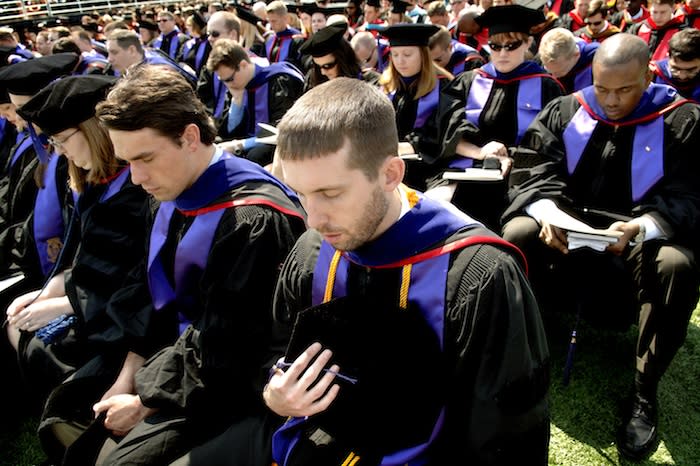 The Ticket
The TicketNot just a Catholic controversy: Protestant colleges threaten to drop student health care over contraceptive mandate
On a chilly winter day earlier this month, 120 college presidents--mostly of Protestant schools--from around the country met in Washington for an annual meeting sponsored by the Council of Christian Colleges and Universities, a group that represents 136 American schools and more than 400,000 students. One topic kept coming up in the discussions: How to combat President Barack Obama's proposed mandate for religious employers to provide health insurance that offers free contraception, a decision that would affect all of their institutions--and could violate some of their deepest-held beliefs.
During the conference, 25 of the presidents held a separate policy meeting to discuss the proposed directive, which was first established in the Affordable Care Act in 2010 and was upheld this year by the Department of Health and Human Services. The mandate, later softened by the Obama administration, would have required non-church religious institutions like schools and hospitals to offer health insurance plans that include free access to contraceptives and abortifacient drugs. Many of these presidents made trips to the offices of their representatives to urge them to fight against the decision.
Much of the news coverage of the battle over the contraception mandate focused on the outcry from the Catholic Church, but employers affiliated with Protestant denominations--especially religious colleges who offer insurance plans to students--waged an equally outspoken crusade against the decision. A coalition of more than 60 faith-based groups co-signed a letter to President Obama in December urging him to broaden exemptions to the mandate, and the council's president, Paul Corts, twice sent letters to the administration urging them to reconsider.
After the Obama administration first announced the mandate, colleges associated with Protestant churches and schools founded as expressly Christian institutions fought for exemptions, warning that the mandate could force them to deny health insurance to students who rely on the school's health care plans.
These critics say that many of the students who attend the schools are unmarried, so covering even preventive products would violate their religious teachings. Similarly, because some within the faith consider drugs like Plan B and Ella--which reduce the chance of pregnancy when taken after intercourse--to be abortion-inducing, the mandate caused problems even for coverage of married students and employees.
"You'd be teaching your students one thing and then providing services that you're teaching are wrong," Shapri LoMaglio, the director of government relations and executive programs at the council, told Yahoo News.
To quell concerns like these, Obama announced on Feb. 10 an "accommodation" for religious employers that would allow those employed by religious institutions to obtain free contraception as part of their employer health insurance, but said that the insurance companies would be required to pay for it, not the religious institutions.
In a statement after Obama's announcement, Paul Corts, the council's president, expressed skepticism that the accommodation plan would resolve the issue.
"Without seeing the final rule it is impossible to tell from the President's general statement if our specific religious liberty issues have been addressed," Corts said. "Therefore, we remain unaware of whether the religious exemption will encompass our schools and their student plans and eliminate all of the violations of conscience issues. We are anxious to get the details and will continue to work with the Administration to try to ensure that the religious liberty of our institutions is protected."
While the Obama administration was still considering how to apply the health care law's mandate to religious groups, several presidents from Protestant colleges sent letters to their representatives and posted them on Regulations.gov, a government site that gathers public comments on rules before they are implemented. Of the schools in the Council of Christian Colleges and Universities, at least 12 submitted comments urging the administration to expand the mandate or eliminate it all together. If churches were exempt, they argued, why aren't institutions that base their bylaws on the same faith-based principles?
"The Department of Health and Human Services hardly seems like the appropriate place for such a determination to be made," wrote Mark Benedetto, the president of the University of Sioux Falls in South Dakota, a school founded by Baptists in 1872. "I am concerned that the regulations as written will violate the conscience of our institution as it relates to the health care plan that we offer to our students--the exemption is for employer plans, as written it does not appear to also include the student plans. Not only would this force our institution to violate our religious convictions by offering emergency contraceptives to our students, it would put us in the awkward position of offering a health care plan to our employees that is consistent with their religious convictions while offering another to our students that violates their religious convictions."
Some schools have already made the decision to revoke insurance to students not covered by their parents. A spokesman from Colorado Christian University, an interdenominational school in Denver that has filed a lawsuit opposing the rule, said students will be forced to seek insurance options elsewhere if the administration does not change course.
"This plan will not be offered in the future if it must be compliant with the administration's mandate thereby forcing American citizens to either compromise their beliefs or go without," said Ron Benton, the school's assistant vice president for administrative services.
More popular Yahoo! News stories:
• White House wary of new affirmative action Supreme Court case
• Obama urges bipartisan support — for his agenda
• Heartland Institute activist on climate-change curriculum: Teach the 'controversy'
Want more of our best political stories? Visit The Ticket or connect with us on Facebook, follow us on Twitter, or add us on Tumblr. Handy with a camera? Join our Election 2012 Flickr group to submit your photos of the campaign in action.




